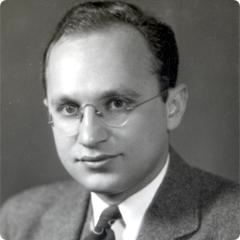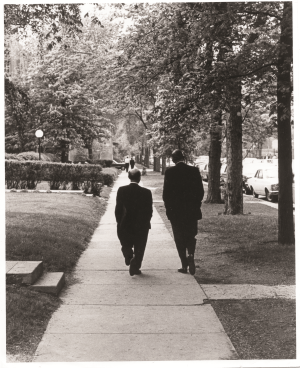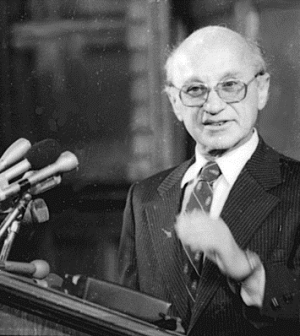
Born July 31 in Brooklyn, N.Y., the fourth and last child of Sarah and Jeno Friedman, immigrants from Carpatho-Ruthenia, then a province of Austria-Hungary. He grew up in Rahway, New Jersey.
Graduated from Rahway High School just before his 16th birthday. His father died during his senior year in high school, leaving his mother plus two older sisters to support the family.
Graduated from Rutgers University. Attending on competitive scholarships, he studied mathematics, intending to become an actuary, but became interested in economics.
Enrolled at UChicago, which “opened new worlds.” He later wrote, “Jacob Viner, Frank Knight, Henry Schultz, Lloyd Mints, Henry Simons and a brilliant group of graduate students from all over the world exposed me to a cosmopolitan and vibrant intellectual atmosphere of a kind that I had never dreamed existed. I have never recovered.”

Earned a Master of Arts in Economics at the University of Chicago. It was also at the University that he met his future wife, Rose Director.
Returned to UChicago, spending a year as research assistant to Henry Schultz.He met and formed a lifelong friendship with fellow students George J. Stigler and W. Allen Wallis.
Worked in Washington at the National Resources Committee on the design of a large consumer budget study then under way. This work later became a principal component of his Theory of the Consumption Function.
Worked at the National Bureau of Economic Research, assisting Simon Kuznets in studies of professional income. This work became his doctoral dissertation at Columbia and introduced the concepts of permanent and transitory income.
Married Rose Director, a fellow economics student who was seated near him alphabetically in his first year of graduate studies. She was a lifelong n active partner in his professional work.
Rose gives birth to their first child, Janet.
Worked at the U.S. Treasury Department for two years on wartime tax policy and at Columbia as a mathematical statistician on problems of weapon design, military tactics, and metallurgical experiments.
His son, David, is born.
Joined George Stigler on the faculty of the University of Minnesota.

Joined the University of Chicago faculty to teach economic theory, and rejoined the NBER to take responsibility for its study of the role of money in the business cycle.
Spent the fall in Paris as a consultant to the U.S. governmental agency administering the Marshall Plan This sparked his interest in floating exchange rates.
Won the John Bates Clark Medal, presented to the best economist under age 40.
Published Capitalism and Freedom, the volume for which Friedman is perhaps best known by the general public.
With coauthor Anna J. Schwartz, he published the monumental A Monetary History of the United States, 1867–1960.
Served as an economic adviser to Senator Goldwater in his presidential run.
Launched a regular column on economic affairs in Newsweek that ran until 1988.

Free To Choose and PBS broadcast a television program representing Friedman's economic and social philosophy. Friedman also publishes the companion book of the series, which becomes the bestselling nonfiction book of the year.
Served as president of the American Economic Association.
Served as an economic advisor to the Nixon presidential campaign.
Traveled to Chile during an economic crisis and gave a series of seven lectures on economic freedom.
Awarded the Nobel Prize in 1976, the 200th anniversary of Adam Smith's Wealth of Nations.
Retired from active teaching at the University of Chicago, remaining linked to the Economics Department and its research activities, and was named a Senior Research Fellow at the Hoover Institution at Stanford University.
Began production work on the PBS television series Free to Choose, filming around the world. The 10-part series aired in 1980.

Advises the Reagan campaign and serves as a member of the President's Economic Policy Advisory Board during his presidency. Makes his first trip to China.
Published Monetary Trends in the United States and the United Kingdom, the last major output of more than three decades of collaboration with Anna J. Schwartz.
Awarded the Presidential Medal of Freedom and the National Medal of Science.
To promote his longstanding interest in school vouchers, he established The Milton and Rose D. Friedman Foundation devoted to promoting parental choice in schooling.
With Rose, he publishes their memoirs, Two Lucky People.
Milton Friedman died Nov. 16 at the age of 94.